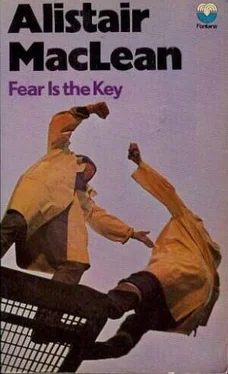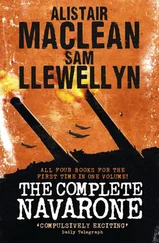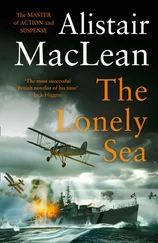There was no moon that night. By and by, even the stars began to go out. Cirrus clouds in long grey sheets began to fill the sky. Then the rain came, not heavy but cold and penetrating, and John Zaimis gave me a tarpaulin for shelter — there was a cabin on the Matapan, but I had no wish to go below.
I must have dozed off, lulled by the motion of the boat, for the next I knew the rain had stopped spattering on the tarpaulin and someone was shaking my shoulder. It was the skipper, and he was saying softly: "There she is, Mr. Talbot. The X 13."
I stood up, using a mast to support myself — the swell was becoming really unpleasant now — and followed the direction of his pointing hand. Not that he needed to point, even at the distance of a mile the X 13 seemed to fill the entire sky.
I looked at it, looked away, then looked back again. It was still there. I'd lost more than most, I didn't have a great deal to live for, but I did have a little, so I stood there and wished myself ten thousand miles away.
I was scared. If this was the end of the road, I wished to God I'd never set foot on it.
I'd heard of those off-shore rigs before. I'd even had one of them described to me by a man who designed them, but I'd never seen one before and now that I did I realised that the description I'd had had been on the same level as my imaginative capacity to clothe with flesh the bare bones of facts and statistics.
I looked at the X 13 and I just didn't believe it.
It was enormous. It was angular and ungainly as was no other structure I'd ever seen before. And, above all, it was unreal, a weird combination of Jules Verne and some of the fancier flights of space-fiction.
At first glance, in the fleeting patches of dim starlight, it looked like a forest of huge factory chimneys sticking up out of the sea. Half-way up their height those chimneys were all joined by a deep and massive platform through the sides of which those chimneys penetrated. And, at the very right hand side, built on the platform itself and reaching up into the sky, mysterious and fragile in the spiderlike tracery of its slenderly interwoven girders, twice the height of the chimneys and outlined against the night sky in its fairy-like festoon of white and coloured operating and aircraft warning lights, was the oil-drilling derrick itself.
I'm not one of those characters who go about pinching themselves to convince themselves that things are real, but if I were I would never have had a better opportunity or reason to pinch than right then. To see that weird Martian structure suddenly thrusting itself up out of the sea would have had the most hardened topers in the country screaming to climb aboard the water wagon.
The chimneys, I knew, were massive tubular metal legs of almost unbelievable strength, each one capable of supporting a weight of several hundred tons, and on this rig I could count no less than fourteen of (hose legs, seven on each side, and there must have been a stretch of four hundred feet between the outer ones at the ends. And the astonishing thing was that this huge platform was mobile: it had been towed there with the platform deep-sunk in the sea and the legs thrusting high up almost to the level of the top of the derrick: arrived at the right spot, those legs had dropped right down to the floor of the sea — and then the whole huge platform and derrick, maybe four or five thousand tons in all and powered by huge engines, had risen dripping from the sea till it was safe beyond the reach of even the highest of the hurricane-lashed waves of the Gulf of Mexico.
All this I had known; but knowing and seeing weren't the same things at all.
A hand touched my arm and I jumped. I had quite forgotten where I was.
"What do you think of him, Mr. Talbot?" It was the skipper. "You like, eh?"
"Yes. It's nice. How much did this little toy cost? Any idea?"
"Four million dollars." Zaimis shrugged. "Maybe four and a half."
"A fair investment," I conceded. "Four million dollars."
"Eight," Zaimis corrected. "A man cannot just come and start drilling, Mr. Talbot. First he buy the land under the sea, five thousand acres, three million dollars. Then to drill a well — just one well, maybe two miles deep — it cost perhaps three-quarters of a million. If he's lucky."
Eight million dollars. And not an investment either. A gamble. Geologists could be wrong, they were more often wrong than right. General Blair Ruthven, a man with eight million dollars to throw away: what colossal prize could a man like that, with a reputation like his, be working for if he was prepared, as he so obviously was prepared, to step outside the law? There was only one way of finding out. I shivered and turned to Zaimis.
"You can get in close? Real close, I mean?"
"All the way." He pointed to the near side of the vast structure. "You have seen the ship tied up alongside?"
I hadn't but I could see her now, a lean dark shape maybe two hundred and fifty feet long, completely dwarfed by the massive rig, the tips of her masts reaching no more than halfway up to the platform deck of the oil rig. I looked back at Zaimis.
"Is that going to queer our pitch, John?"
"Get in our way, you mean? No. We make a wide curve and approach from the south."
He touched the rudder and the Matapan swung away to port, heading to by-pass the X 13 to the south: to have gone to the north, the right, would have brought the Matapan under the glare of the arc and floodlights that illuminated the big working platform round the derrick. Even at a mile we could clearly see men moving around the derrick and the subdued hum of powerful machinery, like that of diesel compressors, came at us clearly over the darkened waters. So much, at least, was in our favour; it had not occurred to me that work on those mobile rigs would go on twenty-four hours a day but at least the clamour of their operations would drown out the throaty whisper of the Matapan's engines.
The boat had begun to corkscrew violently. We were quartering to the south-west, taking that long, deepening swell on our starboard bow and water was beginning to break over the sides of the boat. And I was getting wet. I crouched under a tarpaulin near the rudder, lit a last cigarette under cover and looked at the skipper.
"That ship out there, John. What chances of it moving away?"
"I don't know. Not much, I think. It is a supply and power ship. It brings out food and drink and mud for the drills, and thousands of gallons of oil. Look closely, Mr. Talbot. It is a kind of small tanker. Now it brings oil for the big machines, and perhaps electricity from its dynamos. Later, when the strike comes, it takes oil away."
I peered out under a corner of the tarpaulin. It did look, as John said, a kind of small tanker. I had seen the same type of ship years ago in the war; the high, raised, bare centre-deck and after accommodation and engine-room of the inshore fleet oiler. But what interested me more right then was John's statement that it was there most of the time.
"I want to go aboard that ship, John. Can do?" I didn't want to go aboard, but I knew I had to. The idea of a vessel more or Hess permanently moored there had never occurred to me: now that I knew it to be a fact it was suddenly the most important factor in my considerations.
"But — but I was told you wanted to go aboard the rig itself, Mr. Talbot."
"Yes. Perhaps. But later. Can you manage the ship?"
"I can try." Captain Zaimis sounded grim. "It is a bad night, Mr. Talbot."
He was telling me. I thought it was a terrible night. But I said nothing. Still angling south-west, we were passing directly opposite the middle of one of the long sides of the rig and I could see that the massive steel columns supporting the derrick platform were not so symmetrically arranged as I had imagined. Between the fourth and fifth of the huge legs, on either side, was a gap of perhaps a hundred and fifty feet and here the platform was scooped out to a much lower level than the main deck. On this lower level the thin spindly cigar-shaped outline of a crane reached up as high as the topmost level of the columns: the ship was moored directly below this cut-out well-deck, spanning the gap and a couple of steel pillars on either side of the gap.
Читать дальше
Конец ознакомительного отрывка
Купить книгу












